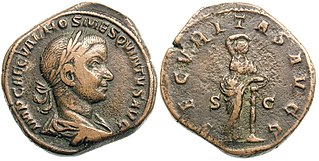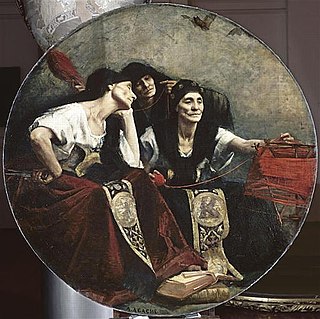Related Research Articles

The denarius was the standard Roman silver coin from its introduction in the Second Punic War c. 211 BC to the reign of Gordian III, when it was gradually replaced by the antoninianus. It continued to be minted in very small quantities, likely for ceremonial purposes, until and through the Tetrarchy (293–313).

Jean-François Champollion, also known as Champollion le jeune, was a French philologist and orientalist, known primarily as the decipherer of Egyptian hieroglyphs and a founding figure in the field of Egyptology. Partially raised by his brother, the scholar Jacques Joseph Champollion-Figeac, Champollion was a child prodigy in philology, giving his first public paper on the decipherment of Demotic in his mid-teens. As a young man he was renowned in scientific circles, and read Coptic, Ancient Greek, Latin, Hebrew and Arabic.

Leo I, also known as "the Thracian", was Roman emperor of the East from 457 to 474. He was a native of Dacia Aureliana near historic Thrace. He is sometimes surnamed with the epithet "the Great", probably to distinguish him from his young grandson and co-augustus Leo II.
Vejovis or Vejove was a Roman god of Etruscan origins.

In Roman mythology, Securitas was the goddess of security and stability, especially the security of the Roman Empire. On coinage Securitas was usually depicted leaning on a column.
In Roman mythology, Verminus was the Roman god who protected cattle from disease. The god may have been inherited from the Indigetes, whom the Romans conquered in 218 BC during the Roman conquest of Hispania. An altar dedicated by consul Aulus Postumius Albinus in 151 BC to Verminus was discovered in 1876, and was housed in the museum of the Antiquarium Comunale in Rome.
In Roman mythology, Volturnus was a god of the Tiber, and may have been the god of all rivers. He had his own minor flamen, a high priest, the Flamen Volturnalis. His festival, Volturnalia, was held on August 27.

Quintus Herennius Etruscus Messius Decius, known simply as Herennius Etruscus, was briefly Roman emperor in 251, ruling jointly under his father Decius. His father was proclaimed emperor by his troops in September 249 while in Pannonia and Moesia, in opposition to Emperor Philip the Arab. Decius defeated Philip in battle, and was then proclaimed emperor by the Roman Senate. Herennius Etruscus was elevated to Caesar in 250, then further raised to Augustus in May 251. When the Goths, under Cniva, invaded the Danubian provinces, Herennius Etruscus was sent with a vanguard, followed by the main body of Roman troops, led by Decius. They ambushed Cniva at the Battle of Nicopolis ad Istrum in 250, routing him, before being ambushed and routed themselves at the Battle of Beroe. Herennius Etruscus was killed in the Battle of Abritus the following year, alongside his father. After the deaths of both emperors, Trebonianus Gallus, who had been governor of Moesia, was elected emperor by the remaining Roman forces.

Hostilian was briefly Roman emperor in 251. Hostilian was born to Decius and Herennia Etruscilla at an unknown date and elevated to caesar in 250 by Decius. After Decius and Herennius Etruscus, Hostilian's brother, were killed at the Battle of Abritus, an ambush by the Goths, Trebonianus Gallus was proclaimed emperor by the legions. Almost immediately, he elevated Hostilian to co-emperor and his own son, Volusianus, to caesar. Hostilian died soon after, either due to plague or being murdered by Trebonianus Gallus.

Chariot racing was one of the most popular ancient Greek, Roman, and Byzantine sports. In Greece, chariot racing played an essential role in aristocratic funeral games from a very early time. With the institution of formal races and permanent racetracks, chariot racing was adopted by many Greek states and their religious festivals. Horses and chariots were very costly. Their ownership was a preserve of the wealthiest aristocrats, whose reputations and status benefitted from offering such extravagant, exciting displays. Their successes could be further broadcast and celebrated through commissioned odes and other poetry.

Tracy Darrell Adkins is an American country music singer and actor. Adkins made his debut in 1996 with the album Dreamin' Out Loud, released on Capitol Records Nashville. Since then, he has released ten more studio albums and two Greatest Hits compilations. In addition, Adkins has charted more than 20 singles on the Billboard country music charts, including the Number One hits "(This Ain't) No Thinkin' Thing", "Ladies Love Country Boys", and "You're Gonna Miss This", which peaked in 1997, 2007, and 2008, respectively.

In modern historiography, ancient Rome encompasses the founding of the Italian city of Rome in the 8th century BC, the Roman Kingdom, Roman Republic, Roman Empire, and the collapse of the Western Roman Empire in the 5th century AD.

The mos maiorum is the unwritten code from which the ancient Romans derived their social norms. It is the core concept of Roman traditionalism, distinguished from but in dynamic complement to written law. The mos maiorum was collectively the time-honoured principles, behavioural models, and social practices that affected private, political, and military life in ancient Rome.

Victor was a Western Roman emperor from either 383/384 or 387 to August 388. He was the son of the magister militum Magnus Maximus, who later became a usurper of the Western Roman Empire, in opposition to Gratian. Maximus rose up in 383, and was recognized as the legitimate emperor in the west by Theodosius I. Victor was elevated to augustus of the Western Roman Empire in either 383/384 or mid-387, making him co-emperor with his father. Maximus invaded Italy in 387, to depose Valentinian II, the brother and successor of the late Gratian. Because of Maximus' invasion, Theodosius invaded the Western Empire in 388. Theodosius defeated Maximus in two battles in Pannonia, before crushing his army at Aquilea, and capturing Maximus. Maximus was executed on 28 August 388. His death was followed quickly by that of Victor, who was executed in Trier by the Frankish general Arbogast.

Scott Edward Adkins is a British actor, film producer and martial artist. He is best known for his roles as the Russian prison fighter Yuri Boyka in Undisputed II: Last Man Standing, Undisputed III: Redemption, and Boyka: Undisputed, Weapon XI in X-Men Origins: Wolverine and for his roles in Day Shift and John Wick: Chapter 4.

Decima was one of the three Parcae in Roman mythology. The Parcae goddess Nona was responsible for pregnancy; Decima was responsible for birth; and Morta was charged with overseeing death. They distributed to mankind all the good and bad things in life, and according to some classical writings even Jupiter had to bend to their will. Decima measured the thread of life with her rod, like her Greek equivalent Lachesis. In some accounts, her mother was Nox the goddess of night and her father was Erebus the god of darkness; while in other accounts, her parents were Jupiter and Themis.
Scott Hendricks is an American record producer who has produced over 30 country music artists. His productions have garnered 121 Top 10s, and 78 Number One hits. Between 1995 and 1997, he was President and Chief Executive Officer of Capitol Records Nashville. Between 1998 and 2001 he served as President and CEO of Virgin Nashville. He now serves as Warner Music Nashville's Executive Vice President of A&R. Acts for whom Hendricks has produced include Restless Heart, John Michael Montgomery, Brooks & Dunn, Trace Adkins, Alan Jackson, Faith Hill, Blake Shelton, Jana Kramer, Dan + Shay, Michael Ray, William Michael Morgan, Drew Parker and Tegan Marie.
Rediculus is an ancient Roman divinity. His cult had a temple near the Porta Capena, and a campus on the Appian Way.

"Hell Right" is a song written by David Garcia, Brett Tyler and Michael Hardy, and recorded by American country music artist Blake Shelton, featuring guest vocals from fellow country artist Trace Adkins. It was released on August 16, 2019 as the second single from Shelton's compilation album Fully Loaded: God's Country.
References
- ↑ Adkins, Lesley; Adkins, Roy A. (1996). Dictionary of Roman Religion. New York: Facts On File. p. 179. ISBN 0-8160-3005-7.